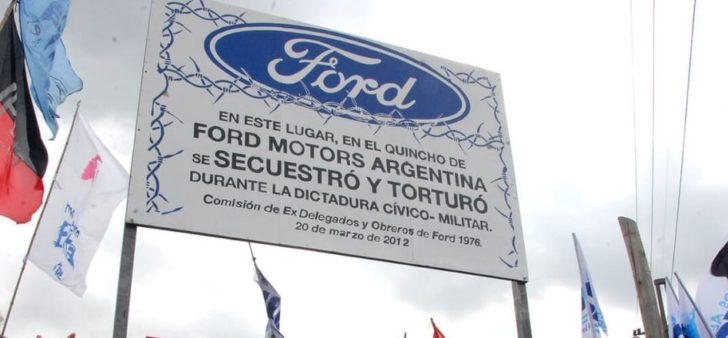Forty years after the fact, the cases that involve economic actors in the crimes against humanity committed during state terrorism are finally beginning to produce results and verdicts. On December 11, Federal Oral Tribunal 1 of San Martín convicted the former head of manufacturing of Ford Motor Company in Argentina, Pedro Müller, to 10 years in prison; the former head of plant security, Héctor Sibilla, to 12 years; and Santiago Riveros, the former head of the Military Institutes of the Army, to 15 years. All three were found to be legally responsible for the crimes of illegal detention and aggravated torture. Riveros was also convicted for illegal raids. The Ford case – as that system of complicity between businesspeople, high-ranking company officials, the military government and members of the Army is known – shows the participation that civilians had in the abduction and torture of workers at the multinational company’s plant in General Pacheco, Buenos Aires province.
A day after the 1976 coup, a key incident took place: Ford executives met with the internal commission of trade-union delegates. That day the workers were told “in a sometimes playful, sometimes violent tone,” that as of that moment the commission would no longer be recognized. One of the delegates asked an executive why the trade union’s ties with the company were being cut, to which the manager of industrial relations, Guillermo Galarraga, responded that “Ford Motor Argentina has become a military objective and priority.” That same person said to the delegate: “Send my regards to Camps.” And since the delegate did not know who Camps was (General Ramón Camps oversaw multiple clandestine detention centers in the province of Buenos Aires), the manager ended the conversation by saying, “You’ll find out soon.”
Galarraga was charged in this case initiated in 2002. Müller and Sibilla indicate that he was the one who allowed a clandestine detention center to be set up in the factory and who identified the workers who should be kidnapped and tortured. This trial, which began in December 2017, should have started before, in July 2014, but because of delay tactics by the defense lawyers, it was postponed until March 14, 2017 – a date that was also pushed back. During that period, Galarraga died.
Seven percent of civilians accused of crimes against humanity are businesspeople. The dictatorship was the opportunity that some company executives saw to resolve labor conflicts in a repressive way and to boost their profits. They put material resources at the military’s disposition, such as cars and facilities, and passed along lists of targeted people, in this way forming yet another link in the structure of state terrorism.
The research compiled in Business responsibility in crimes against humanity: The repression of workers during state terrorism defined to what extent Ford was involved in the dictatorship: on company grounds, a clandestine detention center was set up and operated in the barbecue area of the sports field; it produced a list of workers and gave it to the repressive forces for them to be detained; it facilitated personal files, photographs and trucks for transporting people. Many of the detentions took place inside the factory, during working hours, and before fellow workers and executives.
The workers were represented by lawyers Tomás Ojea Quintana and Elizabeth Gómez Alcorta. The Human Rights Secretariat of the Nation and that of Buenos Aires province also acted as plaintiffs in the trial.

